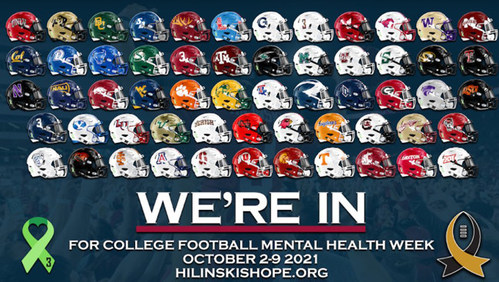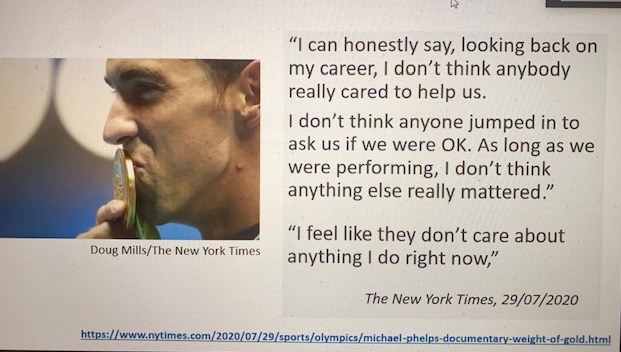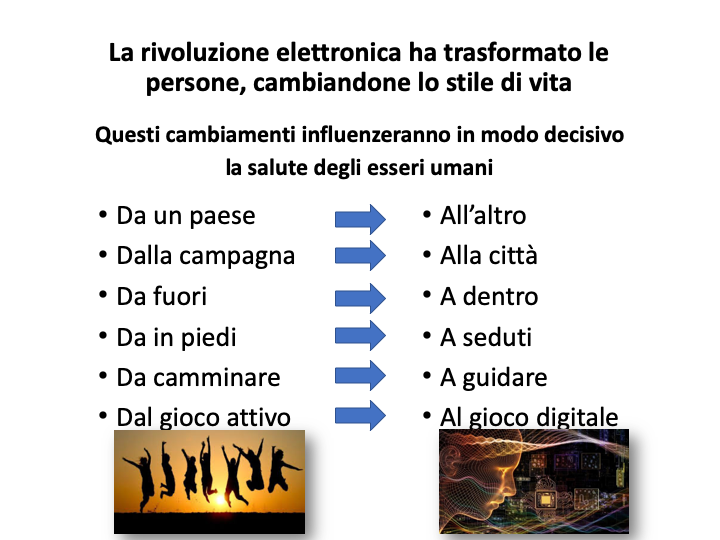Let’s read this text and try to understand that mental health even in sports is a topic to be addressed without hiding behind medals won and a machista culture or more simply behind the indifference of the “I don’t care” philosophy.
CHICAGO, Sept. 30, 2021 /PRNewswire/ – Hilinski’s Hope Foundation (H3H), founded by Mark and Kym Hilinski to honor the legacy of their son Tyler, today announced that 50+ schools around the country will be participating in the second annual College Football Mental Health Week. The week will focus on a series of mental health initiatives, beginning October 2, which will honor Tyler, those lost, and those suffering, and will culminate on October 9.
| • Baylor University | • Northwestern University | • University of Colorado-Boulder |
| • Brigham-Young University | • North Carolina State | • University of Dayton |
| • Claremont-Mudd-Scripps | • North Dakota State University | • University of Georgia |
| • Clemson University | • North Greenville University | • University of Massachusetts |
| • Drake University | • Northern Arizona University | • University of Miami |
| • Duquesne University | • Oklahoma State University | • University of Missouri |
| • Eastern Washington University | • Oregon State University | • University of Mississippi |
| • Florida State University | • Pomona College | • University of San Diego |
| • Georgetown University | • Sacramento State | • University of South Carolina |
| • Georgia Southern University | • Southern Methodist University | • University of South Florida |
| • Idaho State University | • Stanford University | • University of Southern California |
| • Kansas State University | • Stetson University | • University of Tennessee Knoxville |
| • Lamar University | • Stevenson University | • University of Utah |
| • Lehigh University | • Texas A&M | • University of Washington |
| • Liberty University | • Texas Tech University | • Washington State University |
| • Louisiana State University | • Tufts University | • West Virginia University |
| • Louisiana Tech University | • University of Alabama | • Whitworth University |
| • Mercyhurst University | • University of Arkansas | |
| • Middlebury College | • University of Arizona | |
| • Mississippi State University | • UC Berkeley | |
| • University of Buffalo |
“We are so honored that more than 50 schools nationwide will be participating in this year’s mental health awareness week,” said Mark Hilinski. “This year, more than ever, student-athlete mental health has been in the spotlight and while conversation around mental illness can be tough and even at times uncomfortable, it is absolutely critical for the overall health and well-being of our student-athletes. Throughout the last year, we’ve continued to see support from schools, fans, students and parents as they join us in the fight against mental illness and that is a major piece of the puzzle that will help destigmatize mental illness and increase mental health resources. We miss Tyler every single day, but we are grateful to know that what we are doing is making a difference and that he would be proud of us.”
“The College Football Playoff Foundation is happy to support Hilinski’s Hope during College Football Mental Health Week to eliminate stigma and increase mental health resources across the county,” said Britton Banowsky, Executive Director of College Football Playoff Foundation. “We see teachers and coaches often taking on responsibilities related to the basic needs of their students and student-athletes, and this includes mental health. We hope these mental health resources can make a difference in providing what they need to better support their students.”
Participating schools have committed to at least one of the following during the week: showcasing a lime green ribbon on all players helmets with a “3″ in the middle to honor Tyler Hilinski and remember those lost and those suffering in silence; encouraging students, parents, alumni, and fans to participate in showing solidarity, eliminating stigma around mental health by holding three fingers in the sky during the first play of the third quarter; participating in an internal assessment to evaluate how universities are following best practices in terms of mental health programs and include talks and trainings on campus for players, coaches, and staff.
Additionally, on Wednesday, Oct. 6 Hilinski’s Hope will host a mental health training open to student-athletes nationwide. Registration link: https://register.gotowebinar.com/register/7124947916045695501.
To learn more and/or get involved with Hilinski’s Hope Foundation please visit https://www.hilinskishope.org/cfb-mental-health-week.







